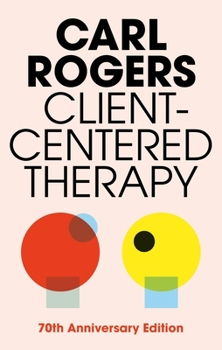Client Centered Therapy
Select Format
Select Condition 
Book Overview
Presenting the non-directive and related points of view in counselling and therapy, Rogers gives a clear exposition of procedures by which individuals who are being counselled may be assisted in achieving for themselves new and more effective personality adjustments.
Format:Paperback
Language:English
ISBN:1841198404
ISBN13:9781841198408
Release Date:January 2021
Publisher:Robinson Press
Length:592 Pages
Weight:1.05 lbs.
Dimensions:1.6" x 5.0" x 7.7"
Customer Reviews
3 ratings
On Rpgers
Published by Thriftbooks.com User , 15 years ago
A great addition to the library for anyone interestd in psychology or in the counseling or human services field
Client-Centered Therapy!
Published by Thriftbooks.com User , 15 years ago
It's an informative book for people interested in types of therapies. Carl Rogers is a great author. Was sent quickly and description was accurate!
A monumental work defining the non-directive technique.
Published by Thriftbooks.com User , 26 years ago
Rogers, the father of humanistic psychology, has created a technique for assisting others to understand and deal with their problems. The non-directive approach relies upon empathy, reflection and clarification to enable the client (patient) to exercise his responsibility for himself. Implicit in the method is the belief that only the client is able to choose a solution for his problems and, with the counselor's (therapist's) help, he will come to a point where he understands the exact nature of his problems enabling him to select solutions consistent with his own values.Non-directive techniques lend themselves to all interpersonal situations where adjustment of behavior to the demands of the environment will lead to greater satisfaction. It can be of particular value in business when counseling employees who are not performing to standard, experiencing difficulties with co-workers, expressing dissatisfaction with their work, etc.The book addresses also application of the approach in play therapy, group centered psychotherapy, group-centered leadership and administration, student-centered teaching, and the training of counselors and therapists. Finally, Rogersdevotes a section to discussion of the implications for psychological theory.Anyone engaged in guiding others should read this book and its predecessor: "Counseling and Psychotherapy".





